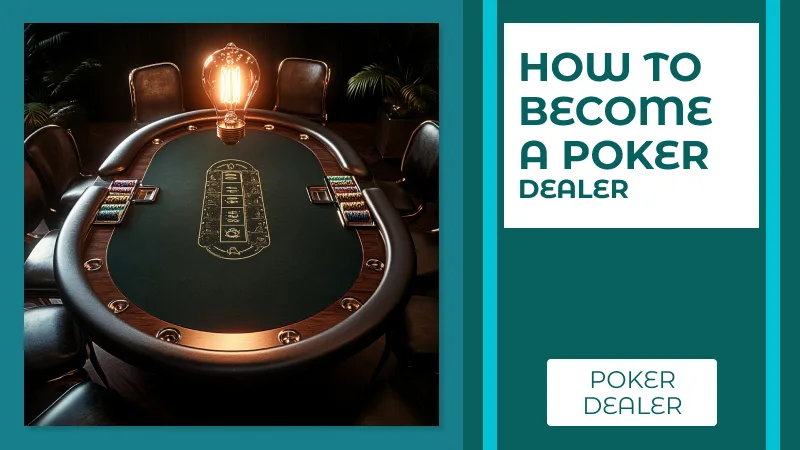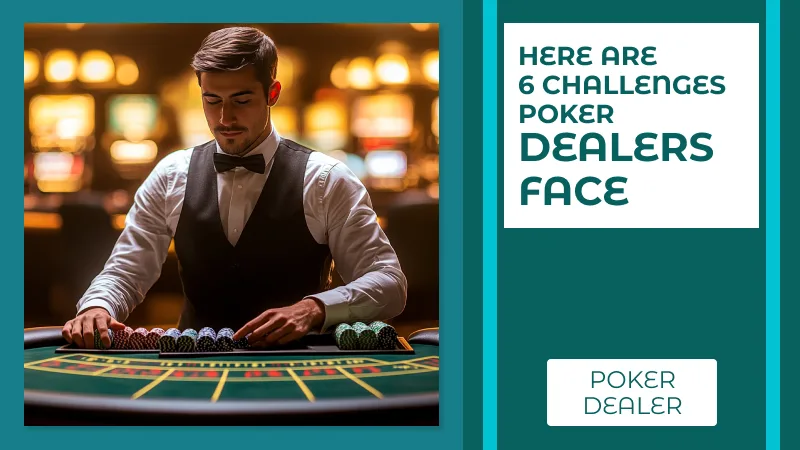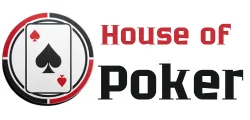Take on the Role of a Poker Dealer
One key thing to know about being a poker dealer is that there are several different formats of the game. From Texas Hold’em to three-card poker each different poker variant has different rules governing the dealer button, the small blind, the big blind, and betting rounds. In Texas Hold’em, for example, dealers are often responsible for dealing out hole cards, dealing the flop, the turn and the river, and managing the pre-flop betting and later rounds of betting. Casino dealers help the players abide by the house rules.
Role of Poker Dealer

The role of a poker dealer encompasses much more than simply dealing the cards. Their role is important in upholding fairness, overseeing the game’s mechanics, and recording the pot and bets. Be it in a casino or a home game, that role demands keen attention to detail, quick decision-making, and good communication skills.
The most fundamental task of a poker dealer to deal the cards properly. Shuffle the deck, cut the deck and deal hole cards or community cards, depending on the type of game. In Texas Hold’em, for instance, they deal two hole cards to each player, then the flop, the turn, and the river. All betting rounds have to be processed in the right order way; meaning… In three-card poker, for example, the dealer needs to distribute three cards to all players and keep the game transparent and fair.
Another key duty is bet management and tracking the pot. Throughout the betting rounds, the dealer also makes sure that bets are placed accurately, that raises are permitted (according to the type of game being played), and confirms that all bets go into the pot. In no limit, you can go all-in at a moment’s notice, so you have to pay a lot of attention to the chips you have at any table. In big blind/small blind games, blinds are posted by the dealer before the pre-flop betting action starts.
A Good Poker Dealer Has These Skills and Qualities

Dealing cards and running the game is just part of being a poker dealer. The world of poker rooms and casinos is fast-paced, high-stakes, and life-changing; it takes a special brand of person to navigate it. A good dealer should be a fast, accurate person that shows professionalism, with control of the players, and guarantees that the game runs smoothly.
The most important skills are communication skills. The dealer determines actions with multiple players at once, calling out betting rounds, raises, and showdowns. This is crucial because poker rooms can get noisy and there are plenty of distractions. Whether laying down the rules to a group of new players or settling disputes among the players, a dealer’s talent with words helps keep the game running smoothly.
Another essential skill is quick maths. A dealer has to constantly adjust pot sizes, make sure the appropriate bet amount is correct, and keep the chips where they’re supposed to be. In Texas Hold’em, where the pot increases after each betting round, the ability to add and redistribute appropriate winnings is an absolute requirement. A person who miscalculates by even a little way can call an argument and cause the game to slow down, so you’ll want to be sharp on the numbers.
How to Become a Poker Dealer

If you love to work in casinos or poker rooms then becoming a poker dealer is a rewarding career. It provides a dynamic workplace, variety of social interactions, and the opportunity to build a skill set that is unlike others. But getting into the industry means training, certification, and experience for a game to run and look seamless and professional.
As the first step in a career as a poker dealer, you must first complete formal training. Many professional dealers go to specialized dealer schools that teach everything from shuffling and dealing the cards to navigating betting rounds and settling disputes. The courses typically last a few weeks and encompass multiple variants of poker such as Texas Hold’em, three-card poker, and stud poker.
These programs concentrate primarily on the fast and efficient dealing of the game, along with ensuring accuracy in payouts, and having a well-rounded knowledge of game rules. Precision is essential, of course, because mistakes can end up costing players and the house money in a casino. Would-be dealers also practice divisions of the deck, how to stack cards on the felt correctly and how to track the pot with multiple bets in play.
There is no formal education for this role, however, certain qualifications will make a candidate more suitable for the job. Strong math skills are also a must, as dealers have to quickly figure out bets, pot sizes, and payouts. Detail matters too, since even a tiny mistake can break the game, causing fights between the players.
Tools Used by Poker Dealers
All poker games are based on the deck of a standard 52 playing cards. Most high-quality decks are used in a casino to avoid the cards from wearing, keeping the game fair. Dealers are tasked with thoroughly inspecting the cards when in use, to ensure there are not bent or marked cards, which could be used by a player to gain an unfair advantage.
Most casinos rotate decks at regular intervals as the game progresses, switching out different sets of the cards. Some poker rooms use even plastic cards, which are more durable and tougher to mark or damage.
In Texas Hold’em and other poker variants, the dealer button is a small disc that moves clockwise around the table after each hand. It shows which player has the last action in every betting interval to put it to fair play. Unlike the dealer in a casino who is a permanent fixture, in a home game players often parade the dealer button around the table, taking turns serving roles as a dealer.
A dealer has chips as other important tools. Chip management is critical, especially in high-stakes games where thousands of dollars may be on the table at the same time. Dealers need to be able to stack, count, and pass chips on the table accurately, while making sure that the right payouts and amounts are at stake.
In certain poker games, especially those played at a casino, automatic shufflers may be used to expedite the game and guarantee that the deck is shuffled randomly. These machines can shuffle cards in seconds, meaning less downtime between hands.
In some variations of poker, a dealing shoe is also used, but this is much more common in card games like blackjack. This enables dealers to spread the top card effortlessly without having to hold the deck in hand.
Here are 6 challenges poker dealers face

Poker is a tense game, and it’s common for players to clash with one another. The dealer has to be a referee, enforcing the rules and keeping things friendly. Be they differences of opinion about whether cards were dealt face up or if there was a mixup on bet sizes, dealers are expected to resolve disputes immediately and bring the matter to a professional conclusion.
One of the biggest issues poker rooms face is cheating, and dealers always need to be aware of what is going on. There are risks such as marked cards on the table, chip dumping, and colluding between players to manipulate outcomes. A good dealer is trained to recognize suspicious behavior and to report it immediately.
When it comes to playing poker, let alone at a high-stakes table with potentially thousands of dollars on the line, it can often be overwhelming. To its credit, the dealer has to keep a lot of things straight, including, correctly counting chips and making sure that payouts are accurate. That pressure is even more pronounced in tournament settings, where millions of dollars can be on the line.
Live Poker Dealers vs Online Poker Dealers
There are a number of major differences that separate live and online poker, and the dealers of the two formats are some of the biggest. A live poker dealer is someone working in a brick and mortar casino or poker room, who shuffles the deck, takes care of the bets and runs the game in real time. They have to shuffle and deal the cards, and keep track of the betting rounds, and resolve disputes between players at the table. Their communication is essential as the interaction with the players is direct.
Online poker dealers, on the other hand, have a different sort of job. In complete virtual poker, software deals the cards and manages the pot. No human dealer is physically there. Unlike random number generators that shuffle virtual cards in traditional online poker, live-streamed online poker features human dealers who sit at tables and interact with players to create a more realistic casino experience. These dealers are in a studio environment and utilize actual decks of cards while delivering a real-time stream to players around the world. They serve mainly to present the game, explain the bets and relate them through digital systems, as opposed to handling chips or overseeing the players and what they do.
The speed is one of the biggest advantages of an online poker dealer. Because automated software handles shuffling and dealing, there is no downtime between hands. Most of the online games run faster than the live games. However, they miss the personal touch and strategic elements that live dealers provide, like reading the players at the table or control the flow of the game with conversation.
How to Behave Towards a Poker Dealer

Player Etiquette: Ways to Respect the Dealer Respecting the dealer is all a part of poker etiquette. The dealer keeps the game fair, keeps it moving and enforces rules, so it’s just important to be nice to the dealer.”
Tipping is a common method of expressing gratitude. Some poker rooms encourage players to tip dealers when they win a pot. And while tipping is not required, it’s a common practice in most casino environments, especially up at the tables, where dealers run games with a job-like professionalism and efficiency. Dealers rely on tips to supplement their pay, and that adds up; a modest tip from every winning hand adds up to a lot of money.
Another cardinal rule of etiquette is to follow the drop-off authority of the dealer. If a player disagrees with a ruling, it’s better to request clarification than to argue. Dealers enforce the game’s rules but do not control the cards being played. It is considered bad manners to blame the dealer for a bad beat or a bad run of cards. Keeping a positive attitude makes the game fun for all involved.
There are misconceptions about dealers, too. Some players feel dealers are fixing the deck or treating them completely differently than other players. Actually the dealer is just a mediocre, neutral, person getting party to the game. Accusations or hostile comments directed at the dealer are not only unjust, they also put a damper on the mood at the table. An expert dealer is all about regulating fair play and keeping the game flowing.
The History of Poker Dealers
This is how the role of a poker dealer has changed over the years. In the early days of poker, especially in the saloons of the American Wild West, the dealer was often one of the players. Cheating was rampant, and there were no hard-and-fast rules. In the absence of dedicated dealers, games depended on trust — or a quick draw if conflicts arose.
As poker migrated to increasingly formal settings, such as private gambling clubs and riverboat casinos, the need for professional dealers became apparent. This close monitoring was only made possible by the introduction of dedicated dealers who would ensure honesty and prohibit any form of cheating — the same protocols that led to our modern structured casino poker. Over time, the dealer button became standard in games like Texas Hold’em to mark which seat was the dealer in games where players took turns playing dealer.
As modern casinos began to proliferate, being a dealer became an actual career. Dealers learned how to shuffle the deck, how to handle multiple betting rounds, and how to enforce the rules of the game. To prevent cheating casinos put strict guidelines and security measures like surveillance cameras.
Conclusion
A poker dealer is not a mere card dealer—they are the very structure of any poker game. They continue a fair game, keep the rounds of betting evolving, and provide a good time for everyone in the table. Whether at home in a small poker room, or in a high-stakes casino, without skilled dealers the game does not run as smoothly or professionally.
The dealer has taken many forms over the years, from high-stakes poker in a smoky saloon to glitzy, high-tech online poker rooms. Though new advancements in the technology created virtual places where digital dealers run games, the live dealer is a vital part of the poker world that will bring not only human interaction but also professionalism to your table.
The next time you’re at the table, spend a minute being grateful for the dealer. They process complex betting scenarios, count chips and keep the peace, all the while maintaining composure in pressure situations. Give them a tip for their help, be nice and treat them with respect. A terrific dealer takes a nice game up a notch and helps poker to be the exciting strategic game it always has been.

